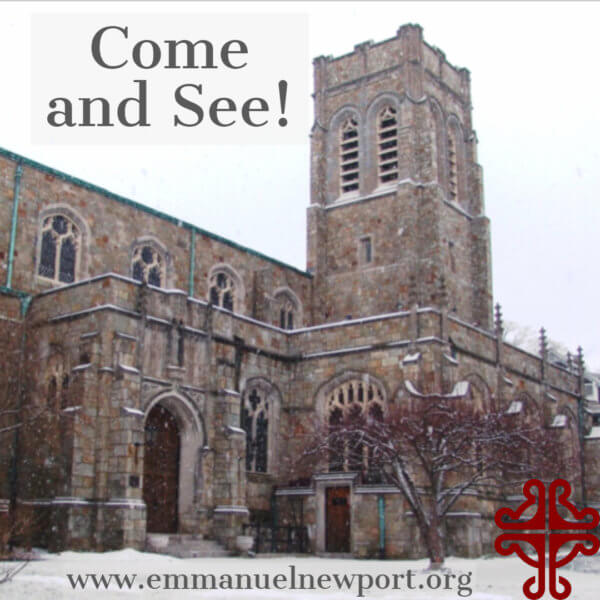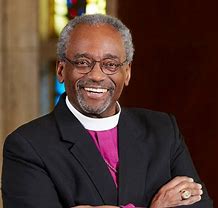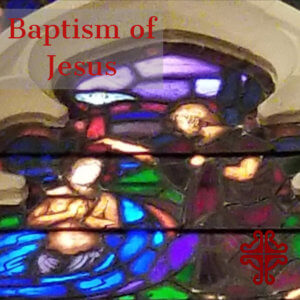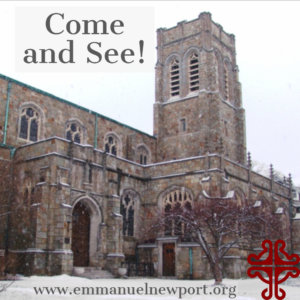
Come and See
Well, this is the week! We will gather today after the 10:00 service for our Annual Meeting. I have been looking forward to seeing our congregation come together since my first day at Emmanuel in September!
It has been a whirlwind little over four months — about 19 weeks — and I’ve gone from trying to learn where all the light switches are to the joy of meeting more and more of you individually, and getting to know you better. This is where the really good stuff is — our connections with each other in Christian community, knowing each other and being known, and leaning into our common efforts here at Emmanuel.
I am thankful for the gift of this Emmanuel community. I have learned that Emmanuel is a wonderful, warm, loving, diverse community, even if we don’t all come to the same service or do the same things when we get here. We are a community even if we don’t all come only on Sundays — or never come on Sundays at all.
Corinth Was Like Emmanuel
 Our epistle this morning — the Apostle Paul’s first letter to the Christians in Corinth — shows a community that is a lot like our Emmanuel community. Let’s take a minute to try to walk in their sandals — to hear Paul’s letter the way we might a letter of instructions or message of encouragement from Bishop Knisely, or a good word or information from Bishop Michael Curry, our Presiding Bishop of The Episcopal Church.
Our epistle this morning — the Apostle Paul’s first letter to the Christians in Corinth — shows a community that is a lot like our Emmanuel community. Let’s take a minute to try to walk in their sandals — to hear Paul’s letter the way we might a letter of instructions or message of encouragement from Bishop Knisely, or a good word or information from Bishop Michael Curry, our Presiding Bishop of The Episcopal Church.
Corinth would have been a new community of Christians — started up by the Apostle Paul carrying the Good News of Jesus into the cities of the Roman Empire. They love their community, have been meeting for a while, and they’ve been joined by some new people, probably. Maybe they’ve run into some questions. Maybe they’re wondering how to adapt to a new circumstance that has come up.
They’ve probably written Paul a letter, asking for clarification or additional guidance. Or maybe someone in the community was trading — buying or selling goods in another community where Paul was preaching and teaching. That would make sense, because while Jesus’ ministry was a rural ministry in the Galilee, Paul’s ministry was urban, in the new commercial cities of the Roman Empire in Greece, Rome, and Asia Minor — which is current day Turkey.
Maybe new people have brought new ideas or different cultural backgrounds to their community. Or maybe they need to figure out how to manage their lives together in community from a practical standpoint — their meeting times, or how to have their agape meals (that’s where our eucharist came from).
Maybe, just maybe, they’re getting ready for their Annual Meeting, to reflect on their life in community and to raise up new leadership for the next year. Maybe there has been some confusion on who makes the right leaders for the community, or how they will allocate their community resources.
And what does Paul say?
First, he tells them that they’re doing just great! Because they are. Paul says
I give thanks to my God always for you because of the grace of God that has been given you in Christ Jesus, for in every way you have been enriched in him, in speech and knowledge of every kind– just as the testimony of Christ has been strengthened among you– so that you are not lacking in any spiritual gift as you wait for the revealing of our Lord Jesus Christ.
A little later in the first letter to the Corinthians, Paul gets right to the nub of what we’re doing today at Emmanuel. Maybe there was a question about how diverse their community had become — what with with newcomers and people who had been there a longer time. After all, Corinth, like Newport, was a port city.
We Are the Body of Christ in Community
So Paul gets really clear with the Corinthians: We’re the body of Christ in community, Paul writes. Just like we are here at Emmanuel.
Every one of us is an important part of the body, even though we all do different things.
We were all baptized in the Holy Spirit into one body with many members, each one doing its part. If the foot would say, “Because I am not a hand, I do not belong to the body,” that would not make it any less a part of the body. And if the ear would say, “Because I am not an eye, I do not belong to the body,” that would not make it any less a part of the body. If the whole body were an eye, where would the hearing be? If the whole body were hearing, where would the sense of smell be?
Our hospitality and imaginations strive for a body with all of its parts included, as they are here at Emmanuel. And every part of that body important and essential to our lives together.
Hospitality and Inclusion
John’s gospel today also points us to that hospitality and inclusion. Jesus is at the very first moment of his earthly ministry — just risen up dripping from the River Jordan after his full immersion baptism by John the Baptist. This ministry is all about invitation, inclusion, and imagination. And it’s not something that you can hear once and just get the first time. Instead, Jesus invites his first disciples — and us, as we listen in to the conversation in our time and context — to Come and See.
Right after John the Baptist baptizes Jesus in the River Jordan, Jesus sees two of John’s disciples following him. Jesus asks them what they’re looking for. Instead of answering Jesus, though, the disciples ask Jesus where he is staying, and Jesus replies, Come and see.
This conversation all seems to be taking place on another level. It’s all more than polite chatter or small talk. Jesus is not really asking John’s disciples if they missed the turn into Jericho from the Jordan River any more than John’s disciples really wonder if Jesus is staying with friends or at a local motel.
John’s disciples addressed Jesus as Teacher on first sight, pivoting their attention from John to Jesus and validating John’s assertions all through this passage that there is one coming who is greater than John, who will baptize with the Holy Spirit instead of water like John does.
Jesus recognizes the disciples as seekers, hungry for new life and meaning. What are you looking for? Jesus asks.
Where are you staying? the disciples ask, answering Jesus’ question with a question of their own.
A Way of Life
What John’s erstwhile disciples are looking for is not some guidepost on the road to Jericho but a way of life. We’re looking for whatever it is you’re doing, Jesus!, is really what they mean. We’re coming with you!! And Jesus invites these first disciples, and us along with them, into community — into discipleship: Come and see, he says.
There is a lot here for us to chew on today, as we gather as disciples in our Annual Meeting at Emmanuel. What are we looking for? What are we hungry for? Connection? Community? Deeper meaning? Ultimate worth?
When we seek deeper meaning, aren’t we asking Jesus where he’s staying, and trying to figure out how to follow him? Aren’t we looking for a way of life? And when we do that, aren’t we responding to Jesus’ invitation to Come and See? Come and See is a simple phrase of both invitation and vision — of hospitality and creativity. And it has special application to us today as we gather for our Annual Meeting.
There are at least 12 different mentions of sight and vision in this single passage about John the Baptist’s witness at the baptism of Jesus. That repetition itself suggests questions for us to consider. We are meant to focus on on this invitation and vision here. Where do we see our places of ministry? What do we see in our communities? What do we see on our way to work?
Are there places we need an invitation to see? What do we not see? What do we overlook, intentionally or not? What are we excited to showcase, and what do we tuck away, hoping no one will notice? Do we invite others to come and see? Let’s ask ourselves these questions as we come together today in our Annual Meeting, with all of our different talents and functions, as Emmanuel Church. Amen

